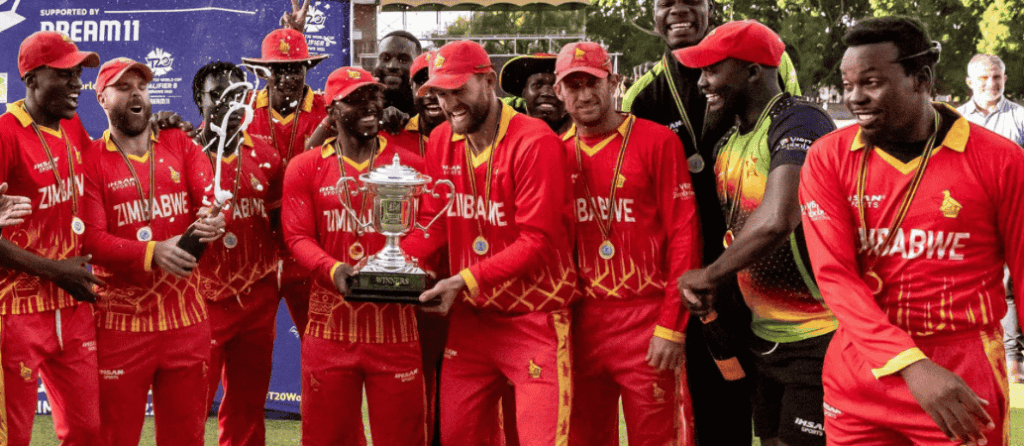- Home
- Live Score
- Schedule
- Achieve
- Teams
- Afghanistan Cricket Team
- Australia Cricket Team
- Bangladesh Cricket Team
- England Cricket Team
- India Cricket Team
- Ireland Cricket Team
- Namibia Cricket Team
- Nepal Cricket Team
- Netherlands Cricket Team
- New Zealand Cricket Team
- Oman Cricket Team
- Pakistan Cricket Team
- PNG Cricket Team
- Scotland Cricket Team
- South Africa Cricket Team
- Sri Lanka Cricket Team
- UAE Cricket Team
- USA Cricket Team
- West Indies Cricket Team
- Zimbabwe Cricket Team
- Series
- County Division One
- County Division Two
- England vs New Zealand [W]
- England vs Sri Lanka [U-19s]
- England vs West Indies
- India tour of Zimbabwe
- India vs South Africa [W]
- Indian Premier League 2024
- Ireland vs Zimbabwe
- Lankan Premier League
- Major Clubs OD [SLC]
- Major League Cricket 2024
- South Africa Women tour of India
- T20 Blast 2024
- Test Championship 2023-25
- The Hundred Mens Competition
- Vitality T20 Blast
- West Indies tour of England
- Women’s Championship
- Womens Asia Cup T20
- World Cup League 2
- Zimbabwe vs India
- Statistics
- Download App
- News
- Home
- Live Score
- Schedule
- Achieve
- Teams
- Afghanistan Cricket Team
- Australia Cricket Team
- Bangladesh Cricket Team
- England Cricket Team
- India Cricket Team
- Ireland Cricket Team
- Namibia Cricket Team
- Nepal Cricket Team
- Netherlands Cricket Team
- New Zealand Cricket Team
- Oman Cricket Team
- Pakistan Cricket Team
- PNG Cricket Team
- Scotland Cricket Team
- South Africa Cricket Team
- Sri Lanka Cricket Team
- UAE Cricket Team
- USA Cricket Team
- West Indies Cricket Team
- Zimbabwe Cricket Team
- Series
- County Division One
- County Division Two
- England vs New Zealand [W]
- England vs Sri Lanka [U-19s]
- England vs West Indies
- India tour of Zimbabwe
- India vs South Africa [W]
- Indian Premier League 2024
- Ireland vs Zimbabwe
- Lankan Premier League
- Major Clubs OD [SLC]
- Major League Cricket 2024
- South Africa Women tour of India
- T20 Blast 2024
- Test Championship 2023-25
- The Hundred Mens Competition
- Vitality T20 Blast
- West Indies tour of England
- Women’s Championship
- Womens Asia Cup T20
- World Cup League 2
- Zimbabwe vs India
- Statistics
- Download App
- News
Latest Zimbabwe Cricket Team Live Cricket Score & Cricket Schedule
Zimbabwe Cricket Team: Latest News and Updates on Cricket Score
Zimbabwe first joined the International Cricket Council in 1992 and played its first Test match that year. The team displayed strong skills over time, reaching the 1999 World Cup semifinals, which excited cricket fans around the world. Zimbabwe competes in three formats: Test, One Day International, and T20, proving its adaptability. To catch the latest updates, match schedules, and player info, check out the official Zimbabwe Cricket website or follow trusted cricket news sources. Exploring Zimbabwean cricket reveals what sets this team apart and why it draws so much passion—keep reading to uncover its fascinating journey.

Table of Contents
ToggleOverview of the Current Zimbabwe Cricket Team
| Attribute | Details |
|---|---|
| Captains | Craig Ervine |
| Coaches | Justin Sammons |
| First International Match | ODI, Test Match, T20I |
| Cricket Board | Zimbabwe Cricket (ZC) |
| ICC Titles | ICC Cricket World Cup, ICC T20 World Cup |
Background of Zimbabwe Cricket Team
Zimbabwe Cricket, originally known as the Zimbabwe Cricket Union, was founded in 1992. The Zimbabwe national cricket team debuted as a full member of the International Cricket Council (ICC) that same year, gaining status to play in Test matches. Zimbabwe has participated in all major ICC tournaments, including the ICC Cricket World Cup, ICC T20 World Cup and ICC Champions Trophy. The team first appeared in the ICC Cricket World Cup in 1983 and reached the semifinals in 1999. The domestic cricket structure in Zimbabwe includes several regional teams and tournaments. The main domestic competition is the Logan Cup, a first-class cricket tournament.
Formation of the Current Zimbabwe Cricket Team
You can see below the accurate formation of the Zimbabwe team which can be an alternative reference for your understanding, namely:
Early Formation and Development
Zimbabwe gained Test status in 1980, and the Zimbabwe cricket team played its first international match in 1983, making its debut in One Day Internationals (ODIs). The early years saw the team participate in various ICC events and develop its cricketing structure.
Official Recognition
The Zimbabwe Cricket Union, now known as Zimbabwe Cricket, is officially founded. The Zimbabwe national cricket team was granted full membership status by the International Cricket Council (ICC) in 1992, allowing them to play Test matches.
Key Milestones of Zimbabwe Cricket Team
Below are some of the keys to the winning achievements achieved by the Zimbabwe Cricket team, namely:
International Competition
International Competition, highlighting the achievements of this team in 1983 with its debut in the ICC Cricket World Cup. The cricket team match scorecard was key in documenting their progress throughout the tournament. The team reached the semi-finals of the Cricket World Cup in 1999, marking their most significant achievement in international cricket.
Domestic Structure,
Domestic Structure, featuring the Logan Cup which was introduced as the premier first class cricket competition in Zimbabwe. The domestic cricket structure, including various regional teams and tournaments, has been key in developing local talent.
Qualified and Participated In Their First Cricket World Cup (1983)
Zimbabwe qualified for and participated in their first Cricket World Cup in 1983. This was the first time that Zimbabwe, then known as Rhodesia, had taken part in the tournament. The 1983 World Cup was held in England, and Zimbabwe made a striking debut by reaching the semi-finals. They were ultimately defeated by India, who went on to win the tournament.
Star Players of Zimbabwe Cricket Team
The following are some of the famous star players from the Zimbabwe cricket team which will provide you with the most accurate information, including:
Andy Flowers
A star batsman and highly skilled wicketkeeper, Flower is considered one of Zimbabwe's greatest cricketers. Known for his excellent technique and consistency with the bat.
Heath Streak
A star player as a standout all-rounder and former captain, Streak was known for his effective bowling and useful batting in the lower order. He played an important role in batting and bowling for Zimbabwe.
Grant Flowers
Was a star performer as a talented batsman who played a key role in Zimbabwe's middle order and made significant contributions with the bat.
Understanding the Leadership Style of the Coach: Justin Sammons
Understanding the leadership style of a coach like Justin Sammons involves examining various aspects of how he guides and influences his team. Sammons likely has a clear vision and strategy for his team, with a focus on long-term goals and immediate goals. His philosophy will shape his approach to training, game tactics and player development. Has a direct vs collaborative communication style that may be direct and authoritarian, or more collaborative and open, depending on his approach to leadership. Effective communication is critical to motivating players and building team cohesion. Sammons may use a variety of motivational techniques to inspire his players, including positive reinforcement, setting challenging goals, and providing constructive feedback.
Current Standing of Zimbabwe Cricket Team and the Future
The current position and future prospects for the Zimbabwe cricket team can be assessed based on various factors:
Current Standing
The Zimbabwe cricket team achieved achievements with the ODI and T20I rankings namely Zimbabwe's position in the ICC (International Cricket Council) rankings for One Day Internationals (ODIs) and Twenty20 Internationals (T20Is) reflecting their recent performance and competitiveness. They often fluctuate in the lower to mid range of those ratings.
The Future
The development and nurturing of young talent through domestic competitions and youth programs is vital to the team's future success. Investment in grassroots and academy cricket can help build a strong pipeline of players. Improved training facilities, support staff, and training resources can improve team performance. Infrastructure development is critical to long-term success.
Conclusion
The Cricketscore is a mainstay for all players who want to enjoy cricket matches in various countries, including the Zimbabwean team, which has participated in all major ICC tournaments, including the ICC Cricket World Cup, ICC T20 World Cup, and ICC Champions Trophy. The team first appeared in the ICC Cricket World Cup in 1983 and reached the semifinals in 1999. Fans can stay updated on Zimbabwe’s performances through live cricket score updates, tracking their progress in real time. The domestic cricket structure in Zimbabwe includes several regional teams and tournaments, with the main domestic competition being the Logan Cup, a first-class cricket tournament.
